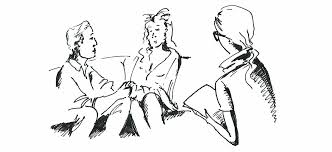Couples counseling, also known as couples therapy or relationship counseling, is a form of therapy that aims to help couples resolve conflicts, improve communication, and strengthen their relationship. There are several different types of couples counseling approaches and techniques that therapists may utilize based on their training and the specific needs of the couple. Here are some common types:
- Cognitive-Behavioral Therapy (CBT): CBT focuses on identifying and changing negative patterns of thoughts and behaviors that contribute to relationship problems. It helps couples develop healthier coping mechanisms and communication skills.
- Emotionally Focused Therapy (EFT): EFT focuses on understanding and reshaping the emotional responses and attachment patterns within a relationship. It aims to foster a secure emotional bond between partners and enhance their overall connection.
- Imago Relationship Therapy: Imago therapy emphasizes the concept that individuals unconsciously choose partners who reflect their unresolved childhood wounds and traumas. It helps couples identify and heal these wounds, leading to increased understanding and empathy.
- Gottman Method: Developed by renowned relationship experts Drs. John and Julie Gottman, this approach combines research-based interventions and techniques to help couples build friendship, manage conflicts, and enhance intimacy. It also emphasizes the importance of building positive interactions and strengthening the foundation of the relationship.
- Solution-Focused Brief Therapy (SFBT): SFBT focuses on identifying and working towards solutions rather than dwelling on the problems. It encourages couples to focus on their strengths, set goals, and develop strategies to achieve them.
- Narrative Therapy: Narrative therapy helps couples understand the stories they tell themselves and others about their relationship. It encourages individuals to reframe negative narratives and develop new, more positive and empowering ones.
- Integrative Therapy: Integrative therapy combines different therapeutic approaches and techniques based on the specific needs of the couple. Therapists who practice integrative therapy tailor their approach to the unique dynamics and challenges of each couple.
It’s important to note that these are just a few examples, and there are many other types of couples counseling approaches and techniques available. Each therapist may have their own preferred methods or may integrate multiple approaches to best suit the needs of the couple they are working with.
Starting couples counseling can be a positive step towards improving your relationship. For you who are thinking about how to get started, Progress Counseling wants to make it easy for you.
Here’s a step-by-step guide to help you get started:
- Discuss the idea together: Begin by discussing your interest in couples counseling with your partner. Choose a comfortable and appropriate time to have an open and honest conversation. Express your concerns, desires, and goals for seeking counseling. Listen to your partner’s perspective and be open to their thoughts and feelings.
- Research and find a qualified therapist: Look for a qualified couples therapist who specializes in relationship counseling. You can search online directories, ask for recommendations from friends, family, or healthcare professionals, or contact local mental health organizations. Ensure the therapist is licensed, experienced, and has a good reputation.
- Schedule an initial consultation: Contact the therapist’s office and schedule an initial consultation session. This session typically serves as an opportunity for you and your partner to meet the therapist, discuss your concerns, and determine if they are a good fit for your needs. Ask about their approach to counseling and any questions you may have.
- Prepare for the first session: Before your first session, take some time to reflect on your relationship and identify the main issues you’d like to address. Think about what you hope to achieve through counseling. It can also be helpful to discuss with your partner what you both expect from the therapy process and what goals you want to work towards.
- Attend the sessions: Attend the counseling sessions together as a couple. Couples counseling usually involves joint sessions where both partners are present. The therapist will create a safe and supportive environment for open communication and guide you through the process. Be open and honest during the sessions, and actively participate in the exercises and discussions provided by the therapist.
- Follow the therapist’s guidance: The therapist will provide insights, techniques, and exercises to help you work through your relationship challenges. They may assign homework or suggest activities for you to practice outside of therapy sessions. It’s essential to be committed and consistent in following their guidance, as this will maximize the benefits of counseling.
- Maintain open communication: Throughout the counseling process, maintain open communication with your partner. Share your thoughts, feelings, and concerns honestly and respectfully. Be receptive to your partner’s feedback and actively listen to their perspective. Effective communication is crucial for the success of couples counseling.
Remember that couples counseling is a collaborative process, and both partners need to be willing to participate and put in the effort. It’s normal to experience challenges and setbacks along the way, but with commitment, patience, and the guidance of a skilled therapist, couples counseling can help strengthen your relationship and improve overall satisfaction.

